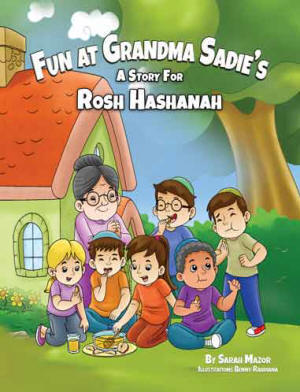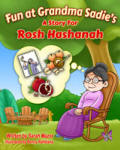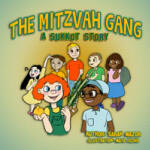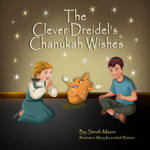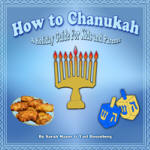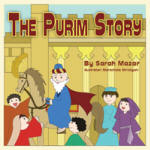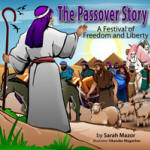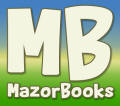
|
| • Holiday Gifts |
| Holiday Central > Rosh Hashanah > Prayers |
By: Daniel Hadar, Contributor
Click Here for More Holiday Articles

|
CHILDREN'S BOOK for AGES 5-11 |
As is evident from the texts of the Rosh HaShanah Tefillot, we do not enumerate our Aveirot on this day. Nevertheless, to experience this awesome day without contemplating Teshuvah is to overlook the very essence of the Days of Awe. As we read in Mussaf "Teshuvah U'Tefilla U'Tzedaka remove the evil of the decree."
True Teshuvah is comprised of two essential components, Charata -- remorse over the past and, Azivat HaChet -- giving up the sin for the future.[The Meforshim agree that Vidui(confession), falls under the catagory of Charata. In fact, Vidui is the only aspect of Teshuvah that is specifically written in the Torah] With Charata, one totally rejects the sinful deeds that he has committed. As Rabeinu Yona puts it (Shaarei Teshuvah 1:10): the penitent should reflect, "What have I done? How did it happen that the fear of Hashem was not before my eyes and that I did not fear the Torah's reproofs against sin and its warnings of terrible punishments? I did not have mercy on my own body, my eyes did not take pity to avoid bringing destruction upon it -- all for a moment of earthly pleasure. '...An ox knows its owner, a donkey its trough"(Yeshayahu 1:3), but I did not know my Creator. I dont perceive, rather, I acted as if I had freed my soul from its Master. I tasted what I perceived as my honey, thereby ignoring my end; I robbed and extorted, I trampled upon the poor, and I did not remember the day of death when my soul will leave behind nothing buy my corpse and its earth."
Regarding Azivat HaChet, Rabeinu Yona writes (Sham 11) that one "abandons his wicked ways and resolves with all his heart that he will never again return to this path."
HaRambam writes the following "And how does one repent? A sinner should abandon his sinfulness, banish it from his thoughts and conclude in his heart that he will never commit such acts again, as it says: "Let the wicked man abandon his way...(Yeshayahu 55:7)...[Let him do all this to such a decree that] the Knower of Secrets will bear witness that he will never repeat the sin in question, as it says: "Take with you words and return to Hashem. Say unto Him...Bear witness for us that we shall no longer refer to our handiwork as our g-d."(Hoshea 14:3-4) And he must also confess with his lips and declare those things that he has concluded in his heart.(Hilchot Teshvuah 2:2)[Sefer Yirah V'Da'at, R' Yehudah Zev Segal ztl]
During Rosh HaShanah we are only to think of Teshuvah, but it is now the time leading up to Day of Judgment that we must be actually doing Teshuvah. Now is the time to prepare of the court case, because once we are in the "court room" we cannot prepare anymore. Let us all spend this time preparing and in that merit win our trial and have an amazing Bracha filled year AMEN!
-----
Daniel Hadar
http://www.ohrdaniel.com

Mazor Guide to Rosh Hashanah brings you much more about the holiday, its meaning and its traditions... See the links below.
- Rosh Hashanah Home Page
- Rosh Hashanah for Jews Without a Prayer
- What Does Rosh Hashanah Celebrate?
- Rosh Hashanah Customs
- Symbolic Foods
- The Shofar Blasts!
- Candle Lighting & Blessing
- Special Prayers for a Special Holiday
- Torah Reading for Rosh Hashanah
- Tashlich
- Rosh Hashanah Shopping
.jpg)
Buy Kosher Wines for Rosh Hashanah!!
Articles
- Preparing for the Court Case by Daniel Hadar
|
|
|
|

|
| • Holiday Gifts |
|
|
 |
| • Celebrations Gifts |
|
·
Wedding Gifts · Bar Mitzvah Gifts · Baby Gifts · Jewish Books at Great Prices |
KOSHER BY DESIGN Amazing New Kosher Cookbook. BUY |
Mazor Guides: Wealth of Information and Resources
- Mazor Guide - The Ultimate Guide to
Living Jewish -
- Guide to Jewish
Holidays -
-
Bar Mitzvah
and Bat Mitzvah Guide -
-
Guide to a
Jewish Wedding -
-
Guide to Jewish Celebrations -
-
Guide to Kosher Living -
- Infertility and
Judaism: A Guide -
- The Get (Gett)
- the Jewish Divorce: A Guide -
- Zei
Gezunt: Jewish Perspective on Health -
- Jewish Genetic Diseases -
-
Death and Mourning in
Judaism -
Copyright 1998-2024 MazorNet, Inc.
| http://www.MazorGuide.com | http://www.MazorBooks.com | http://www.Kosher-Directory.com | http://www.JewishCelebrations.com




